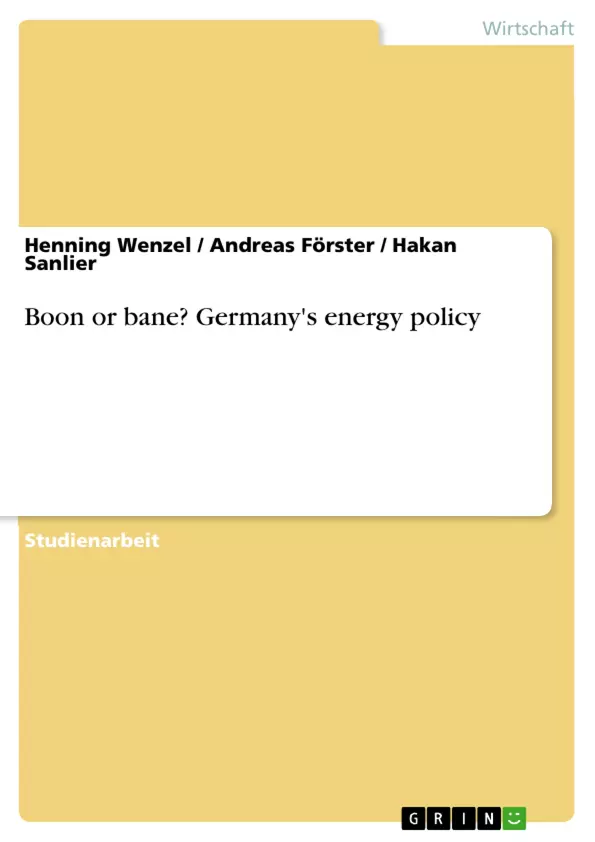The availability of natural resources is decreasing. Because of the current living standards in industrial countries and also the high energy consumption for the production of goods the worldwide natural resources of 1.4 earths are used every year. There has to be a change in the usage of natural resources all over the world. Between the demand for electricity and the offer there must always be a balance. The higher the demand, the more power plants have to produce energy. The costs are entirely dependent on the insert type of power plants.
Germany follows the ambitious target to become the world´s most energy-efficient and environmental friendly economy by generating 80% of its electricity with renewable energy sources in 2050. In 2011 Germany was already able to produce 20% of its energy with renewable energy sources. This is not only good for the environment but also helps to decrease the costs for imports of fossil energy sources.
In order to achieve the ambitious goal and to become a role model for all other countries Germany has to invest in infrastructure dramatically. Further it takes time and coordination efforts to succeed. However an alternative doesn’t seem to be at hand looking at the availability of worldwide resources. Another important side effect of using renewable energy sources are of course the reduction of the so called greenhouse gases and in the same time avoiding the risk of nuclear energy disasters such as in Chernobyl and Fukushima.
Although fulfilling the steps towards Germany’s energy policy seems to be complex and costly at first the long term goal is worthwhile pursuing. It should be in everyone’s interest and in the interest of future generations to have a long term energy policy. Germany can set the rules and play a vital role worldwide in the future. We just have to make sure that the process is fair for all stakeholders.
Inhaltsverzeichnis
- Executive Summary
- Table of Contents
- Table of Figures
- Table of Abbreviations
- Introduction
- Analysis of the energy sector
- Current Energy Situation
- Energy Sources
- Power generation
- Distribution of electricity
- Power consumption
- Market structure
- Industry structure analysis
- Electricity producer
- Electricity suppliers
- Market regulation
- Formation of prices
- European Energy Exchange
- Price sharing - Households
- Development of prices for households
- Germanys Energy Policy
- Concept of sustainable energy policy
- Economic efficiency
- Security of supply
- Environmental compatibility
- Targets of German energy policy
- Ways to succeed the “Energiewende”
- State interventions
- Economic efficiency
- EEG
- Governmental subsidies for fossil fuels
- Security of supply
- Grid expansion
- Grid stability
- Power plants
- Environmental impact
- Status quo Deutscher Energiewende-Index (DEX)
- Conclusion
- Analyse des aktuellen Energiemixes und der Herausforderungen der Energiewende
- Bewertung der wirtschaftlichen, ökologischen und sicherheitsrelevanten Aspekte der deutschen Energiepolitik
- Untersuchung von staatlichen Interventionen und Fördermaßnahmen im Bereich der erneuerbaren Energien
- Bewertung der Auswirkungen der Energiewende auf die Preise für Strom und die Wettbewerbsfähigkeit der deutschen Wirtschaft
- Diskussion des Status quo der Energiewende und der zukünftigen Herausforderungen
Zielsetzung und Themenschwerpunkte
Die Arbeit analysiert die deutsche Energiepolitik und beleuchtet die Herausforderungen und Chancen der Energiewende. Sie befasst sich mit dem Ziel, Deutschland zur energieeffizientesten und umweltfreundlichsten Volkswirtschaft der Welt zu entwickeln, indem bis 2050 80% des Strombedarfs aus erneuerbaren Energiequellen gedeckt werden sollen.
Zusammenfassung der Kapitel
Das erste Kapitel führt in die Thematik der deutschen Energiepolitik ein und beleuchtet die globale Bedeutung des Themas im Kontext der Verknappung von Ressourcen und der Notwendigkeit einer nachhaltigen Energieversorgung.
Das zweite Kapitel analysiert den aktuellen Energiemix in Deutschland und beleuchtet die verschiedenen Energiequellen, die Stromerzeugung, die Verteilung des Stroms und den Stromverbrauch.
Das dritte Kapitel befasst sich mit der deutschen Energiepolitik und erläutert das Konzept einer nachhaltigen Energiepolitik, die auf den drei Säulen der Wirtschaftlichkeit, der Versorgungssicherheit und der Umweltverträglichkeit basiert.
Das vierte Kapitel beleuchtet die konkreten Ziele der deutschen Energiepolitik, die mit der Energiewende verfolgt werden.
Das fünfte Kapitel analysiert die verschiedenen Wege und Maßnahmen, die zum Erfolg der Energiewende führen können.
Das sechste Kapitel untersucht den aktuellen Stand der Energiewende und die Entwicklung des Deutschen Energiewende-Index (DEX).
Schlüsselwörter
Energiewende, erneuerbare Energien, Nachhaltigkeit, Energieeffizienz, Versorgungssicherheit, Umweltverträglichkeit, EEG, staatliche Interventionen, Strompreise, Wettbewerbsfähigkeit, Deutscher Energiewende-Index (DEX).
Häufig gestellte Fragen
Was sind die Hauptziele der deutschen Energiewende?
Ziel ist es, bis 2050 80% des Stroms aus erneuerbaren Energien zu gewinnen und Deutschland zur energieeffizientesten Volkswirtschaft der Welt zu machen.
Welche Rolle spielt das Erneuerbare-Energien-Gesetz (EEG)?
Das EEG ist das zentrale Steuerungsinstrument, das durch Einspeisevergütungen den Ausbau von Wind-, Solar- und Biomasseenergie wirtschaftlich attraktiv macht.
Wie wird die Versorgungssicherheit trotz fluktuierender Energien gewährleistet?
Dies erfordert massive Investitionen in den Netzausbau, die Netzstabilität sowie die Bereitstellung flexibler Kraftwerke und Speicherlösungen.
Welchen Einfluss hat die Energiewende auf die Strompreise für Haushalte?
Die Kosten für den Ausbau und die staatlichen Umlagen haben zu einem Anstieg der Preise geführt, was die Debatte über die wirtschaftliche Effizienz der Maßnahmen befeuert.
Was ist der Deutsche Energiewende-Index (DEX)?
Der DEX ist ein Indikator, der den Status quo und den Fortschritt der Energiewende in Bezug auf Umweltverträglichkeit, Wirtschaftlichkeit und Versorgungssicherheit misst.
- Citation du texte
- Henning Wenzel (Auteur), Andreas Förster (Auteur), Hakan Sanlier (Auteur), 2013, Boon or bane? Germany's energy policy, Munich, GRIN Verlag, https://www.grin.com/document/315517



